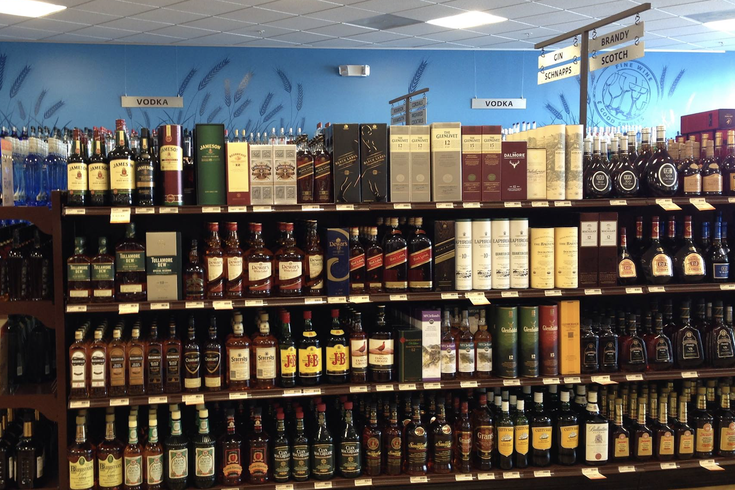
March 03, 2022
 PA Wine Spirits/Facebook
PA Wine Spirits/Facebook
While Pennsylvania voters largely support privatizing the state-run liquor system, a divide exists over whether it should be done through a constitutional amendment, a Franklin & Marshall College poll found.
Pennsylvania Republicans have recently renewed their efforts to dissolve the state-run liquor system by calling for a referendum that would place the issue in the hands of voters.
However, a new poll released Thursday by Franklin & Marshall College's Center for Opinion Research found that Pennsylvania voters are split over whether a constitutional amendment is the best path forward to potentially privatize liquor and wine sales in the state.
The survey found that 46% of registered Pennsylvania voters approve of enacting a constitutional amendment to remove the state from the alcohol business, while 42% of voters voiced their opposition. The difference fell within the poll's six-point margin of error.
Overall, Pennsylvania voters largely support the privatization of wine and spirits sales. The poll found that 52% of voters support disbanding the state-run liquor system, compared to only 36% of voters who oppose. Those numbers have remained consistent over the last 20 years, pollsters said.
In Philadelphia and Southeastern Pennsylvania, 57% of voters expressed support for privatization, while 32% were opposed.
Franklin & Marshall surveyed 490 registered Pennsylvania voters from Feb. 21-27. The poll also asked voters questions about the direction of the state, the economy and job approval ratings of President Joe Biden and Gov. Tom Wolf.
The poll results come almost two months after GOP legislators in Harrisburg introduced a resolution for a constitutional amendment that would prohibit the Pennsylvania Liquor Control Board from manufacturing and selling alcohol. The resolution is currently under consideration by the House Liquor Control Committee.
If the General Assembly passes it in consecutive legislative sessions, the bill would bypass the governor's desk and appear as a ballot question. The referendum would appear during the first primary or general election that occurs at least three months after it is passed. The earliest this can occur is May 2023.
The privatization of liquor and wine sales in Pennsylvania would take effect no sooner than 18 months after voters approve the ballot measure.
For years, Republican lawmakers have sought to remove Pennsylvania from the liquor and wine business and have faced staunch Democratic opposition. One effort met Gov. Tom Wolf's veto pen in 2015.
The governor's office told PhillyVoice in a statement that the GOP's latest effort to prevent the state from selling alcohol "goes too far."
"It wouldn’t modernize the system – it would cheat the people of Pennsylvania out of an asset they own while at the same time jeopardizing Pennsylvania workers’ jobs," the governor's office said.
Other Democratic lawmakers and UFCW Local 1776, the union that represents Fine Wine and Good Spirits store workers, argued that privatization would result in thousands of lost jobs, increased prices and a more limited selection.
Democrats also contend privatization would lead to a state budgetary loss of nearly $750 million and more underage patrons accessing liquor and wine.
The Pennsylvania Chamber of Business and Industry and the Pennsylvania Restaurant and Lodging Association are among the organizations that support privatization. Along with Republican lawmakers, they argue it would help reduce prices for customers and liquor license holders.
Franklin & Marshall's poll illustrated the partisan divide on privatization. The survey found that 65% of Republicans and 55% of independents support the idea, compared to only 36% of Democrats.
The PLCB, which was created nearly 90 years ago to regulate liquor and wine sales, has sought to stay out of the politics of privatization.
The effort to privatize alcohol sales reemerged last year when state lawmakers considered bipartisan legislation to permanently legalize to-go cocktails, which were temporarily permitted at the onset of the COVID-19 pandemic.
Republicans added an 11th-hour amendment that would have allowed grocery stores, beer distributors, convenience stores and bars to sell pre-canned alcoholic beverages. The amendment also would have allowed businesses with liquor licenses to sell up to 192 ounces of ready-to-drink products for off-premise consumption while implementing no limits on distributors selling these drinks.
Democratic lawmakers opposed the amendment and ultimately withdrew their support for the bill, arguing that it would lead toward the privatization of wine and spirits and weaken the PLCB's ability to fund the state's budget. GOP legislators expressed their support for the amended legislation, citing the tax revenue benefits that it would bring to the state.
The measure ultimately collapsed after Wolf threatened to veto the amended legislation.
Follow Pat & PhillyVoice on Twitter: @Pat_Ralph | @thePhillyVoice
Like us on Facebook: PhillyVoice
Add Pat's RSS feed to your feed reader
Have a news tip? Let us know.